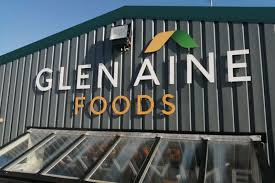
Scaling Smarter: Glen Aine Foods Transforms Production with Digital Tools

Industry
Food Production
Challenge
Paper-based processes and spreadsheets caused inefficiencies, limited visibility, and made tracking costs, yields, and inventory difficult.
Results
Digitising operations with Bubble apps, Katana MRP, and Power BI streamlined workflows, improved traceability, and unlocked €250K annual savings.
Key Products
KatanaMRP, Bubble
Digitising our production operations with Bubble and Katana has transformed the way we work. Our teams can now manage every step of production efficiently, while real-time insights on costs, yields, and inventory give us confidence to make smarter, faster decisions.

Donal Galvin
General Manager @ Glen Aine Foods

About Glen Aine Foods
Glen Aine Foods is an Irish meat manufacturer based in Ballycahill, County Limerick, specializing in cooked ham and beef products. Producing around 45 tonnes of cooked meat weekly, the company supplies retail, foodservice, and manufacturing customers with hams, cooked beef, bacon, pulled pork, and diced meats.
The Challenge
Glen Aine Foods, a leading producer of cooked ham and beef, faced growing challenges in managing its production operations. With processes heavily reliant on paper-based systems and spreadsheets, the business struggled to achieve efficiency, accuracy, and visibility across key areas:
-
Cost Control – Tracking production costs was difficult due to fluctuating raw material prices. Calculating unit costs for each product was slow and resource intensive.
-
Operational Visibility – Throughput and cycle times across different operations and product lines were poorly understood, making it hard to optimise production.
-
Traceability & Quality – All traceability and quality records were paper-based, making analysis slow and error-prone.
-
Yield & Inventory Management – Yields were calculated in spreadsheets, while inventory was manually tracked at the end of each day, limiting accuracy and responsiveness.
-
Supplier & Consumption Insights – There was no real visibility into consumption rates, supplier performance, or effective cost per kilogram of meat.
These challenges created bottlenecks across planning, manufacturing, and inventory management—ultimately restricting Glen Aine Foods’ ability to scale operations and maintain profitability.
The Solution
Rubik Technologies partnered with Glen Aine Foods to design and implement a modern digital production system that replaced fragmented, paper-heavy workflows with a connected, operator-friendly digital infrastructure.
-
Using the low-code Bubble platform, we built operator-centric apps tailored to each individual production operation. These apps allowed staff to capture data directly at the point of activity, digitising workflows, reducing paperwork, and ensuring information flowed seamlessly across the production floor.
-
The Katana MRP system was introduced to orchestrate planning and tracking of work orders and batch records. Katana provided a central hub for recipe management, stock control, production scheduling, and batch traceability, ensuring accuracy, compliance, and efficiency.
-
To give management real-time oversight, we implemented a Power BI reporting platform that delivered insights into cycle times, cost of production, yields, inventory movements, supplier performance, and consumption rates.
Together, these solutions replaced outdated manual systems with an integrated digital ecosystem that empowered operators, streamlined planning, and gave leadership full visibility of production and financial performance.
The Results
The transformation delivered measurable benefits across Glen Aine Foods’ operations. By eliminating manual paperwork and digitising core processes, the company significantly reduced administrative overhead and operational inefficiencies, achieving annual cost savings of over €100K. Staff were able to focus on higher-value tasks, while managers gained real-time insights to monitor performance, optimise resources, and reduce waste.
With enhanced data visibility, Glen Aine Foods could track production efficiency at every stage—from planning to finished goods—ensuring better yield management, accurate costing, and tighter control of inventory movements. The company also gained new insights into supplier performance, meat yields, and effective cost per kilogram, enabling smarter purchasing decisions and improved profitability.
This digital-first approach not only boosted productivity but also positioned Glen Aine Foods for long-term scalability and sustainable growth.
.png?width=148&height=50&name=Main%20Logo%20Black%20Version%20(1).png)